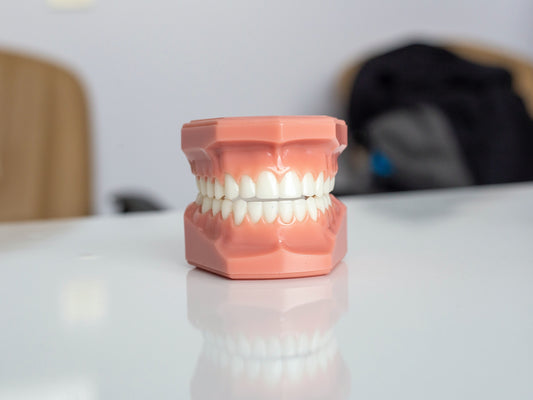A strong immune system is necessary to keep the human body healthy. Without a strong immune system in place, the body is vulnerable to harmful microbes, such as bacteria, viruses, parasites, yeast, and even self-created cancer cells [1].
Vitamins, either taken as supplements or obtained naturally from food, can help boost our immune systems, and strengthen our defenses against these unwanted microbes [2].
Great news, right? You can make easy tweaks to your habits and routine (like starting or ending your day with our new Immunity product) that can result in an overall strengthened immune system.
If you're interested in supporting your immune system with vitamins, the B vitamins are a fantastic place to start. You might be wondering, what are those again?

What Are B Vitamins?
There are 8 different types of B vitamins. Together, they are called the B vitamins or B-complex vitamins. These are the 8 types of B vitamins:
- Vitamin B1: Thiamine
- Vitamin B2: Riboflavin
- Vitamin B3: Niacin
- Vitamin B5: Pantothenic acid
- Vitamin B6: Pyridoxine/pyridoxal/pyridoxamine
- Vitamin B7: Biotin
- Vitamin B9: Folate/folic acid
- Vitamin B12: Cobalamin
If you've seen B vitamins while supplement shopping before, you might've noticed some of them are marketed as "hair, skin, and nails" vitamins. This claim is largely due to B7, or biotin.
Biotin is thought to promote hair growth since 38% of women with hair loss are suffering from biotin deficiencies [3]. In animal studies, biotin deficiencies have been shown to cause skin problems as well [4]. Keeping up your biotin may help your hair or skin over time.
B vitamins are also famously (or perhaps infamously) marketed as “hangover cures.” Unfortunately, scientists haven't yet studied if there’s any validity to this. A quick internet search will show that many people swear by the remedy, however.
Another popular way of getting a B-complex supplement is with an IV drip. High-end spas administer B vitamins through a needle instead of by mouth, claiming this method is healing and boosts energy.
If you're interested in a B-complex IV drip, beware: although obtaining B vitamins through a needle might provide benefits, it comes with a greater risk of side effects than if you took B vitamins by mouth [5].

B Vitamin Consumption
The average person should consume B vitamins on a daily basis, whether in supplement form or through the foods you eat. B vitamins are essential, and unlike some other vitamins, the human body can't produce or store them.
It’s worth noting that you can easily consume B vitamins by mouth every single day because they are water-soluble [6]. Water-soluble vitamins are absorbed through the intestines. Once the body has enough of them in a given moment, any remaining vitamins are filtered out through the kidneys and bladder. Since our bodies are regularly filtering out excess water-soluble vitamins, we need to constantly replenish those vitamins. If we don't ingest water-soluble vitamins such as B vitamins on a daily basis, we run the risk of vitamin deficiency.
This stands in contrast to fat soluble vitamins. If we consume excess fat soluble vitamins, our body will store the excess in the liver and body fat, then use it later. Since our body stores fat soluble vitamins, consuming them on a daily basis is less urgent.
All B vitamins and vitamin C are water soluble. The remaining vitamins, which include vitamins A, D, E, and K, are fat soluble [7].
Do B Vitamins Help the Immune System?
Research shows that B Vitamins appear to be very important when it comes to maintaining a healthy immune system. Studies connecting B vitamins with the immune system date back to 1960 [8]. Different B vitamins play different roles in the body as far as immunity is concerned. Let’s dive and learn more.
Vitamin B1: Thiamine
More research is needed, but thiamine appears to provide protection when the body's immune system is under attack.
Researchers have found that thiamine, along with ascorbic acid (Vitamin C), plays a protective role in bodies dealing with sepsis, a life-threatening response to a body being overtaken by infection [9]. Thiamine has also been demonstrated to help treat tuberculosis as part of a broader wellness plan [10].
Vitamin B2: Riboflavin
Riboflavin boosts immunity by acting as an antioxidant and anti-inflammatory [11]. A review of riboflavin studies shows that this B vitamin has been demonstrated to help with malaria infections, sepsis, and general immune support.
Vitamin B3: Niacin
Niacin's connection to the immune system hasn't been studied as much as the other B vitamins, but there does seem to be one. For example, niacin was documented as being a useful treatment for the auto-immune disease ulcerative colitis [12]. In another study, niacin also showed promise to help people with HIV, a serious infective immune disorder [13].
Vitamin B5: Pantothenic Acid
Vitamin B5 seems to play a major role in immunity and contributes to the healing process with any cuts or wounds [14]. Researchers are eager to learn more about B5, which appears to be able to both turn on and turn off inflammation as needed. Both increasing and reducing inflammation are functions of a healthy immune system.
Vitamin B6: Pyridoxine/Pyridoxal/Pyridoxamine
Another B vitamin that helps regulate inflammation in the immune response is B6. As a result, a B6 deficiency can impair the immune systems of elderly adults [15]. Supplementation of vitamin B6 has been shown to provide protective effects. B6 supplements help reduce inflammation in people infected with HIV [13] and improve the immune response in critically ill patients [16].
We chose to include Vitamin B6 (650% of your daily value) in our Immunity products because of its regulatory properties and immune support. Taking Vitamin B6 or our Immunity products alone will not cure, prevent, or treat any illness, but rather, are a great addition to your daily wellness routine for overall strength and defense.
Vitamin B7: Biotin
Researchers don't know as much about the relationship between biotin and immunity as they do about other B vitamins. That said, B7 still seems connected to the immune system. Research shows biotin deficiency contributes to increased inflammation, which suggests that biotin plays an anti-inflammatory role in the immune response [17].
Vitamin B9: Folate/Folic Acid
According to experts, folic acid plays a "crucial role" in the immune system support [18]. When folic acid levels become too low, they can "drastically alter" a person's immune response. What does that mean? Folic acid is a B vitamin you may want to include in your overall wellness plan for immune support. A research study of healthy people found that taking 5 mg of folic acid daily boosted immunity [19].
Vitamin B12: Cobalamin
B12 could play as important of a role in immunity as B9 [18]. Research shows that B12 supplementation has helped to decrease inflammation in people infected with HIV [13], but as always more research is needed.
Like B9, we included Vitamin B12 (1170% of your daily value) in our new Immunity products because of its anti-inflammatory properties and overall immune support. Research shows its role in general immunity wellbeing, but again, we always caution that taking Vitamin B12 or drinking our Immunity products alone is not a cure all for your immune system or in fighting an illness or disease.
Do B Vitamins Cause Side Effects?
Most people won't experience side effects as a result of taking B-complex vitamins. That said, some rare cases have emerged in which people experienced toxicity as a result of taking B vitamins [21, 22]. If there’s any concern about underlying health conditions, we always err on the side of caution and recommend you consult with your primary care physician before beginning a new vitamin regimen.
People taking biotin should be aware that the supplement can interfere with results of an immunoassay, a test often given to people experiencing immune system problems [23]. If your doctor requires you to take such a test, ask if you need to discontinue taking biotin supplements in advance of the test. Our Immunity products do not contain biotin in our ingredients.

B Vitamins and Hydration
Our new Immunity products help to hydrate you and meet your daily wellness needs. When we created our Immunity line, we looked into building up a person’s overall immune support and wellbeing—no matter the season. Including Vitamins B6 and B12 as well as Vitamin C, ginger, and zinc helps to create a well rounded support system for an immune boost. Be sure to try our new flavors—Lemon Ginger for a tart, herbal flavor or Hot Apple Cider for a sweeter, spiced drink (designed to be mixed in hot water)—and support your wellness routine all year round.
Takeaway
Our bodies require B vitamins on a daily basis. Research shows that all 8 types of B vitamins are connected to a healthy immune system in some way. If you aren't eating foods rich in B vitamins on the daily, supplementation may be something to look into.
<!--split-->
<!-- split -->
Sources
[1] National Institute of Allergy and Infectious Diseases. "Overview of the Immune System." 2013. Available from: https://www.niaid.nih.gov/research/immune-system-overview
[2] Iddir, Mohammed; Brito, Alex; Dingeo, Giulia; Sosa Fernandez Del Campo, Sofia; Samouda, Hanen; La Frano, Michael R., and Bohn, Torsten. "Strengthening the Immune System and Reducing Inflammation and Oxidative Stress through Diet and Nutrition: Considerations during the COVID-19 Crisis." In: Nutrients. 2020. Available from: https://www.ncbi.nlm.nih.gov/pmc/articles/PMC7352291/?report=classic
[3] Trüeb, Ralph M. "Serum Biotin Levels in Women Complaining of Hair Loss." In: International Journal of Trichology. 2016. Available from: https://www.ncbi.nlm.nih.gov/pmc/articles/PMC4989391/?report=classic
[4] Ogawa, Youichi; Kinoshita, Manao; Sato, Takuya; Shimada, Shinji; and Kawamur, Tatsuyoshi. "Biotin Is Required for the Zinc Homeostasis in the Skin." In: Nutrients. 2019. Available from: https://www.ncbi.nlm.nih.gov/pmc/articles/PMC6520690/?report=classic
[5] U.S. National Library of Medicine. "Vitamin B Complex." In: DailyMed. 2017. Available from: https://dailymed.nlm.nih.gov/dailymed/drugInfo.cfm?setid=282ccec8-9bcd-4571-9b91-bbb96ef2620d
[6] Said, Hamid M. "Intestinal Absorption of Water-Soluble Vitamins in Health and Disease." In: Biochemical Journal. 2014. Available from: https://www.ncbi.nlm.nih.gov/pmc/articles/PMC4049159/?report=classic
[7] National Research Council (US) Committee on Diet and Health. "Fat-Soluble Vitamins." In: Diet and Health: Implications for Reducing Chronic Disease Risk.1989. Available from: https://www.ncbi.nlm.nih.gov/books/NBK218749
[8] Axelrod, A.E. and Hopper, Sarah. "Effects of Pantothenic Acid, Pyridoxine and Thiamine Deficiencies upon Antibody Formation to Influenza Virus PR-8 in Rats." In: The Journal of Nutrition. 1960. Available from: https://academic.oup.com/jn/article-abstract/72/3/325/4775963?redirectedFrom=fulltext
[9] Marik PE. "Hydrocortisone, Ascorbic Acid and Thiamine (HAT therapy) for the Treatment of Sepsis. Focus on Ascorbic Acid." In: Nutrients. 2018. Available from: https://pubmed.ncbi.nlm.nih.gov/30441816/
[10] Hu S, He W, Du X, et al. "Vitamin B1 Helps to Limit Mycobacterium Tuberculosis Growth Via Regulating Innate Immunity in a Peroxisome Proliferator-Activated Receptor-γ-Dependent Manner." In: Frontiers in Immunology. 2018. Available from: https://www.frontiersin.org/articles/10.3389/fimmu.2018.01778/full
[11] Suwannasom, Nittiya et al. “Riboflavin: The Health Benefits of a Forgotten Natural Vitamin.” In: International Journal of Molecular Sciences. 2020. Available from: https://www.ncbi.nlm.nih.gov/pmc/articles/PMC7037471/
[12] Li, Juanjuan et al. “Niacin Ameliorates Ulcerative Colitis Via Prostaglandin D2-Mediated D Prostanoid Receptor 1 Activation.” In: EMBO Molecular Medicine. 2017. Available from: https://www.ncbi.nlm.nih.gov/pmc/articles/PMC5412792/
[13] Poudel-Tandukar K, Chandyo RK. "Dietary B Vitamins and Serum C-Reactive Protein in Persons With Human Immunodeficiency Virus Infection: The Positive Living With HIV (POLH) Study." In: Food Nutr Bull. 2016. Available from: https://pubmed.ncbi.nlm.nih.gov/27370977/
[14] Gheita, Alaa A.; Gheita, Tamer A.; and Kenawy, Sanaa A. "The potential role of B5: A stitch in time and switch in cytokine." In: Phytotherapy Research. 2019. Available from: https://onlinelibrary.wiley.com/doi/full/10.1002/ptr.6537
[15] Meydani SN, Ribaya-Mercado JD, Russell RM, Sahyoun N, Morrow FD, Gershoff SN. "Vitamin B-6 Deficiency Impairs Interleukin 2 Production and Lymphocyte Proliferation in Elderly Adults." In: American Journal of Clinical Nutrition. 1991. Available from: https://pubmed.ncbi.nlm.nih.gov/2021134/
[16] Cheng, C., Chang, S., Lee, B. et al. "Vitamin B6 Supplementation Increases Immune Responses in Critically Ill Patients." In: European Journal of Clinical Nutrition. 2006. Available from: https://doi.org/10.1038/sj.ejcn.1602439
[17] Agrawal, Sudhanshu et al. “Biotin Deficiency Enhances the Inflammatory Response of Human Dendritic Cells.” In: American Journal of Physiology. 2016. Available from: https://www.ncbi.nlm.nih.gov/pmc/articles/PMC5129763/?report=classic
[18] Mikkelsen, Kathleen and Apostolopoulos, Vasso. "Vitamin B12, Folic Acid, and the Immune System."In: Mahmoudi M., Rezaei N. (eds) Nutrition and Immunity. 2019. Available from: https://link.springer.com/chapter/10.1007/978-3-030-16073-9_6
[19] Paniz C, Bertinato JF, Lucena MR, et al. "A Daily Dose of 5 mg Folic Acid for 90 Days Is Associated with Increased Serum Unmetabolized Folic Acid and Reduced Natural Killer Cell Cytotoxicity in Healthy Brazilian Adults." In: Journal of Nutrition. 2017. Available from: https://pubmed.ncbi.nlm.nih.gov/28724658/
[20] Todorova, Tatina T.; Ermenlieva, Neli; and Tsankova, Gabriela. "Vitamin B12: Could It Be a Promising Immunotherapy?" In: Immunotherapy - Myths, Reality, Ideas, Future. 2016. Available from: https://www.intechopen.com/books/immunotherapy-myths-reality-ideas-future/vitamin-b12-could-it-be-a-promising-immunotherapy-
[21] Vrolijk MF, Opperhuizen A, Jansen EHJM, Hageman GJ, Bast A, Haenen GRMM. "The Vitamin B6 Paradox: Supplementation with High Concentrations of Pyridoxine Leads to Decreased Vitamin B6 Function." In: Toxicology In Vitro. 2017. Available from: https://pubmed.ncbi.nlm.nih.gov/28716455/
[22] Ellsworth, Marc A et al. “Acute Liver Failure Secondary to Niacin Toxicity.” In: Case Reports in Pediatrics. 2014. Available from: https://www.ncbi.nlm.nih.gov/pmc/articles/PMC3965920/
[23] Samarasinghe S, Meah F, Singh V, et al. "Biotin Interference with Routine Clinical Immunoassays: Understand the Causes and Mitigate the Risks." In: Endocrine Practice. 2017. Available from: https://pubmed.ncbi.nlm.nih.gov/28534685/



























